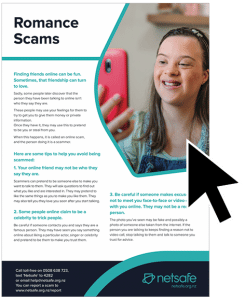Plain language romance scams
Netsafe and Spectrum Care have written this plain language romance scams guide. It offers advice for people with an intellectual disability, and those who support them. You can read our other plain language guides here. Romance scams: plain language guide Finding friends online can be fun. Sometimes, that friendship can turn to love. Sadly, some people…

Netsafe and Spectrum Care have written this plain language romance scams guide. It offers advice for people with an intellectual disability, and those who support them. You can read our other plain language guides here.
Romance scams: plain language guide
Finding friends online can be fun. Sometimes, that friendship can turn to love.
Sadly, some people later discover that the person they have been talking to online isn’t who they say they are.
These people may use your feelings for them and try to get you to give them money or private information. Once they have it, they may use this to pretend to be you or steal from you.
When this happens, it is called an online scam, and the person doing it is a scammer.
Here are some tips to help you avoid being scammed.
1. Check if the person is who they say they are.
If you haven’t met them in person, your online friend may not be who they say they are because scammers can pretend to be someone else to make you want to talk to them. They will ask questions to find out what you like and are interested in, or pretend to like the same things as you to make you like them. They may also tell you they love you soon after you start talking to them.
2. Be careful if someone makes excuses not to talk online.
If someone makes excuses not to meet you face-to-face or video chat with you online, they may not be a real person.
The photo you’ve seen may be fake and possibly be a photo of someone else taken from the internet. If the person you are talking to keeps finding a reason not to video call, stop talking to them and talk to someone you trust for advice.
3. Get advice if someone contacts you and says they are famous.
Be careful if someone contacts you and says they are a famous person. They may be a scammer who has seen you say something online about liking a particular actor, singer or celebrity and pretend to be them to make you trust them.
4. Don’t tell or send any personal information.
This includes:
- login details or passwords to your social media accounts
- bank or savings account numbers or passwords
- your date of birth
- your phone number
- your address
- your passport number
5. Don’t send any money.
Scammers may tell you about problems they or their family are having that need money to be fixed. They are hoping you will offer to give it them.
They may even ask you for money for a specific reason, such as for a train ticket so they can travel to meet you. They will sound like they mean it because they may have done this before with someone else and are good at lying. Do not be embarrassed if you believed them.
How to get help
- If you are worried your online girlfriend, boyfriend or someone you’re dating may be a scammer:
- don’t give them money
- tell whānau or friends you know and trust in real life
- talk to Netsafe for free and confidential advice on what to do next.
Plain language: Romance scams (PDF, 2.5MB)
Report it
Netsafe offers a free service for people who are upset or hurt by something that happens online. We can explain how the Harmful Digital Communications Act (HDCA) may apply to you. This law deals with image based abuse, incitement to suicide and extremely offensive, abusive or harassing content.
- Call us toll-free on 0508 638 723
- Text ‘Netsafe’ to 4282
- Email [email protected] for online safety help
- Report it online
What happens when you contact Netsafe
Netsafe will:
- ask you questions to understand what has been happening to you. We can check if the HDCA may apply to you. This law deals with image based abuse, incitement to suicide and extremely offensive, abusive or harassing content
- talk about ways to stop the abuse
- suggest other people you can talk to who may be able to help
We will continue to add to our plain language pages, so please get in touch if there is an area you think we should cover. Email your suggestions to [email protected]
KEEP UP TO DATE
Follow us on social media and sign up to our enewsletter for alerts, news and tips.








